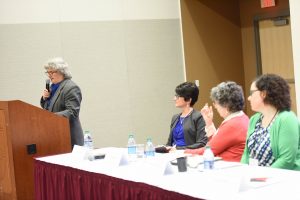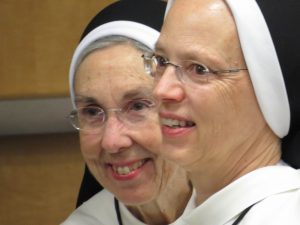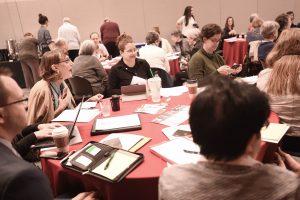
March 29, 2017 saw a gathering of more than 80 archivists, librarians, and information specialists working with religious order archives at The Catholic University of America to discuss the status and future of Catholic religious order archives. The conference marked the third in a series on “Catholic Archives in the Digital Age.”
The gathering began with presentations by four well-known scholars in the field of American Catholic studies discussing the significance of religious order archives in researching and writing Catholic, American, and global history. Leslie Tentler, Emerita Professor at The Catholic University of America, kicked off the day’s first panel, “For Posterity: Religious Order Archives and the Writing of American Catholic History,” with observations on the worth of religious order archives to the scholar seeking to understand basic structures of American Catholic institutions. Diocesan records cannot be used solely to tell the full story of Catholic education in the U.S., for example. Why? Many schools were run by religious orders, and where diocesan records often have little in the way of religious order records related to discipline, pedagogical ideals, student socialization and the emotional climate of schools run by religious orders—these archival materials have historically been kept by the teaching religious themselves.

Carol Coburn, Professor of Religious Studies at Avila University, followed this thread in her talk—religious order records help tell a story that can’t be told otherwise. As Director of the Martha Smith, CSJ, Ph.D., Archives and Research Center at Avila University in Kansas City, Missouri, Coburn works with Archviist Adonna Thompson to preserve records of the Sisters of Saint Joseph of Carondelet. Coburn maintains that “to fully know the story of American Catholicism, you have to know what religious orders are doing at any given historical time period.” As Mary Beth Fraser Connolly, lecturer at Purdue University, pointed out in her discussion of the journal of Sister Justina Segale of the Sisters of Charity in Cincinnati, resources such as these offer insight into the everyday lives of religious. Sister’s journal entry for April 4, 1968 reads: “While eating dinner, a flash came over the TV that Dr. Martin Luther King, Jr. was shot. Only minutes later a special news report confirmed: Martin Luther King Jr., has been assassinated!” Far from being removed from the concerns and interests of everyday Americans, the journal shows, here and elsewhere, that women religious were of course tied into the daily lives of ordinary Americans. And yes, they watched TV. Malachy McCarthy, Archivist for the Claretian Missionary Archives in Chicago, Illinois, took a different approach in his talk. Using the example of a scholarly monograph on Mexican Americans, he illustrated the pitfalls of not consulting religious order records, in this case the male Claretian missionaries, who were heavily involved in ministry to Mexican Americans. In his otherwise solid Becoming Mexican American: Ethnicity, Culture, and Identity in Chicano Los Angeles, 1900-1945 (1993), historian George Sanchez was unable to access records related to the Claretians’ work with a key Los Angeles population in which the La Placita parish is situated. Instead he examined secondary works and diocesan records related to the population with the result that his chapter on religion could not include valuable information from the Claretian archives (not open to the public at the time) in his work.

Our second session featured a panel of some of the most well-respected archivists of materials related to the Catholic experience in the U.S. The Associated Archives at St. Mary’s Seminary and University in Baltimore, Maryland is the home of a collaborative effort of the Archdiocese of Baltimore, St. Mary’s Seminary and University, and the U.S. Province of the Society of St. Sulpice, or the Sulpicians, and serves as the repository of these three organizations’ archives. Its archivist, Tricia Pyne, offered the group a genealogy of how several Catholic institutions worked to make that collaboration happen. Ellen Pierce, Consulting Archivist with the Maryknoll Archives offered an overview of holdings there, with an emphasis on the importance of producing value in maintaining archives for institutional stakeholders. Denise Gallo, Provincial Archivist for the Daughters of Charity Archives in Emmitsburg, Maryland, focused her talk on how the Daughters of Charity Provincial Archives merged records of that order from multiple locations, emphasizing the role in communications among various stakeholders in achieving optimal archival goals and visibility. Emilie Gagnet Leumas, Director of Archives and Records for the Archdiocese of New Orleans, focused on her Archive’s effort to work out temporary agreements with those institutions or individuals who may want to make short-term agreements with the Archdiocese. Finally, Patricia Lawton of the Catholic Research Resources Alliance (CRRA) at Notre Dame University gave a fine overview of the many unique services offered to the Catholic archival community by the CRRA.
The afternoon session wrapped things up with an overview of a survey of Catholic archives done by Young Choi, Professor of Library and Information Science (LIS) at the Catholic University and LIS Graduate Student Emily Nilson. Many of the issues that have plagued Catholic archives for decades continue to pose as challenges. Most collections, for example, remain hidden and inaccessible to potential users, in part because there is no information on such collections on the internet. Still, almost all Catholic archives have some web presence and staff are eager to gain training in born-records collection, digitization of materials, and to continue processing. The reportage of the results led to a lively discussion among audience members, who eagerly shared and sought out information.
The Archives will be posting a website with resources and the presentations of scholars and archivists this summer—stay tuned!
Also see:
Catholic News Service: http://www.catholicnews.com/services/englishnews/2017/panel-archives-of-religious-orders-tell-history-of-us-church.cfm
The Fate of Religious Order Archives: https://www.lib.cua.edu/wordpress/newsevents/8901/
